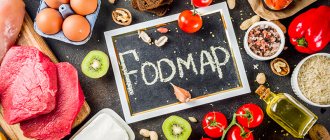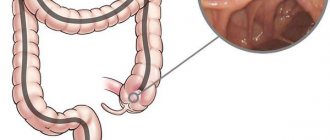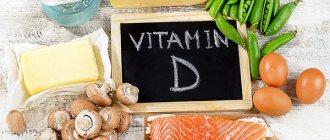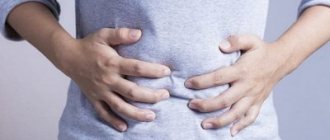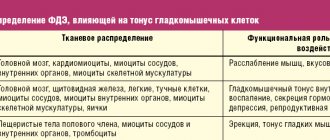Irritable bowel syndrome is a common digestive disorder. The disease is accompanied by a feeling of discomfort, abdominal pain, a feeling of incomplete emptying, bloating and rumbling in the abdomen, constipation and/or diarrhea. It is a functional bowel disorder in which abdominal pain is invariably associated with defecation or changes in the character and consistency of stool, and this distinguishes it from functional diarrhea or constipation, where pain is absent, and from functional bloating, which is not accompanied by modifications in the characteristics of bowel movements.
Pain has occurred at least 1 day per week over the past 3 months and is associated with at least 2 or more of the following:
- pain associated with bowel movements;
- associated with changes in stool frequency;
- associated with a change in the shape of the stool.
When diagnosing IBS and dividing patients into clinical variants, doctors are guided by the Bristol Stool Shape Scale and use types 1 and 2 of stool shape to identify constipation and types 6 and 7 of stool produced to identify diarrhea.
Bristol stool shape scale:
Type 1 – separate dense lumps, “sheep” type stool Type 2 – sausage-type feces, consisting of lumps Type 3 – sausage type with cracks on the surface Type 4 – smooth, soft feces sausage Type 5 – soft balls with smooth edges 6 type – mushy stool, soft lumps of feces with a porous structure; type 7 – watery or completely liquid feces without dense lumps.
Features of the course of irritable bowel syndrome: a tendency to persistence (from the Latin reg-sisto - constantly stay, remain) of the clinical picture (usually during the first two years from the onset of the disease), a recurrent course with frequent exacerbations (especially in the first 3 months after diagnosis), simultaneous presence (initially or subsequent appearance) of symptoms of other functional diseases, the potential for transformation of IBS into the clinic of other gastrointestinal disorders of the “CNS-gut” interaction.
Diagnosis of IBS
Be prepared that the doctor will prescribe a number of tests and examinations to rule out other intestinal diseases, including infectious ones. The fact is that IBS is a diagnosis of exclusion. It is diagnosed when the results of all or most tests are normal, but the patient experiences the above symptoms for several weeks or months.
When making a diagnosis of IBS, the following symptoms of “anxiety” must be excluded:
- unmotivated weight loss;
- nocturnal manifestation of the disease;
- onset of the disease in old age;
- constant intense pain as the main symptom of gastrointestinal tract damage;
- family history of colorectal cancer, inflammatory bowel disease, or celiac disease;
- presence of fever;
- enlargement of the liver, spleen, lymph nodes of various groups;
- blood in stool;
- changes in the clinical blood test (increased leukocytes, ESR, decreased hemoglobin);
- changes in biochemical blood parameters (increased liver tests, signs of damage to the pancreas).
Diagnosis of IBS is based on three key points:
- collection of complaints and analysis of medical history;
- physical examination;
- carrying out a minimum number of laboratory tests and instrumental studies, and only if indicated - an additional set of necessary studies.
Patients with typical symptoms of IBS in the absence of alarming signs usually do not need additional examinations or the need for them is minimal. Laboratory methods: clinical blood test, fecal occult blood test, detailed biochemical blood test, fecal calprotectin, thyroid hormones, serological tests for celiac disease, bacteriological examination of feces if infectious genesis of diarrhea is suspected.
Instrumental techniques:
- colonoscopy (FCS) is indicated for patients 50 years of age and older and patients of any age if empirical therapy is ineffective;
- gastroscopy if celiac disease is suspected or tests positive for it;
- ultrasound examination of the abdominal organs;
- Ultrasound examination of the pelvic organs if pain is suspected of being related to a gynecological problem.
Nutrition for pain and colitis
A proper diet for pain syndrome is compiled taking into account the calorie content of foods and excludes any external irritation that causes an exacerbation of the condition. The cause of pain is excessive intestinal activity, so dishes should be warm and ground. Recommended: portion weight no more than 200 g and 6 meals a day.
Among the recommendations of experts:
- Stewed fish or meat.
- Boiled vegetables.
- Scrambled eggs.
- Herbal teas containing oak bark.
To avoid intestinal colic, in addition to diet, it is necessary to take medications prescribed for the treatment of IBS, and also avoid stress.
Therapeutic diet for IBS
For people with irritable bowel syndrome, diet plays an important role in treatment. Patients are recommended to eat 5-6 times a day in small portions, without taking long breaks between meals.
It is better to adhere to a certain meal schedule - this helps to normalize the functioning of the digestive glands. The diet will be even more effective if you keep a diary of your daily diet, which will help identify foods that lead to an exacerbation of the condition. This way you can adjust the sample menu and achieve a speedy recovery.
To select a diet, it is important to establish the prevailing symptoms of the disease, since nutrition for irritable bowel syndrome with diarrhea and constipation will be significantly different. Only a gastroenterologist can do this correctly. But there is also a list of foods that should not be consumed for any form of IBS.
Causes
— Eating disorders: overeating, skipping meals, frequent consumption of fast food, processed foods and fatty foods adversely affect the functioning of the gastrointestinal tract.
— Stress: frequent exposure to stressful situations and the inability to work with emotions are the main provoking factors of the disease.
Complications
IBS does not lead to organic pathologies in the digestive system, but only causes functional disorders. Therefore, the disease cannot lead to life-threatening complications.
What should you not eat if you have irritable bowel syndrome?
Pain in irritable bowel syndrome is triggered by stretching or, conversely, spasms of the intestine. Therefore, the diet for IBS is aimed at eliminating the factors that cause it. Excessive pressure on the intestinal wall is caused by increased gas formation and a large amount of feces (retained in the intestine due to constipation). Flatulence and impaired intestinal motor function occur both due to errors in the diet and due to impaired functioning of the organs that produce digestive enzymes. Therefore, for those with irritable bowel syndrome, the diet excludes the following foods:
- Irritating substances - marinades, hot spices, alcohol, sour vegetables and fruits, foods high in salt, caffeine, smoked foods.
- Products that cause fermentation and flatulence - fresh fruits and vegetables in large quantities, legumes, carbonated drinks, sweets, whole milk, rye bread, kvass.
- Products that negatively affect the functioning of the liver and pancreas are fatty meats and fish, animal fat (butter, lard), fried foods.
- The most suitable way to cook food is to steam it, boil it or bake it in the oven.
Fully or partially limited products
- Dishes that stimulate secretion are strong and fatty broths.
- Products and dishes that increase fermentation in the intestines (beer, legumes, rye bread, fresh baked goods, vegetables with coarse fiber, wholemeal flour, kvass, carbonated water).
- Vegetables containing irritating essential oils (such as radish, garlic, celery, onions, spinach, radishes).
- It is prohibited to consume spicy foods, fatty meats and poultry, hot sauces, canned meat and fish, mustard, smoked meats, horseradish, pepper, and all meat products. If desired and rarely, you can eat boiled sausage and frankfurters.
- Cooking fat, millet, pearl barley, corn, barley, pork and beef fat, margarine are excluded.
- The consumption of chocolate, ice cream, cakes, grape juice, cabbage juice, kvass, carbonated fruit drinks and cold drinks is not allowed.
Table of prohibited products
| Proteins, g | Fats, g | Carbohydrates, g | Calories, kcal | |
Vegetables and greens | ||||
| vegetables legumes | 9,1 | 1,6 | 27,0 | 168 |
| swede | 1,2 | 0,1 | 7,7 | 37 |
| cucumbers | 0,8 | 0,1 | 2,8 | 15 |
| parsnip | 1,4 | 0,5 | 9,2 | 47 |
| parsley (root) | 1,5 | 0,6 | 10,1 | 49 |
| radish | 1,2 | 0,1 | 3,4 | 19 |
| white radish | 1,4 | 0,0 | 4,1 | 21 |
| turnip | 1,5 | 0,1 | 6,2 | 30 |
| celery | 0,9 | 0,1 | 2,1 | 12 |
| horseradish | 3,2 | 0,4 | 10,5 | 56 |
| garlic | 6,5 | 0,5 | 29,9 | 143 |
| spinach | 2,9 | 0,3 | 2,0 | 22 |
| sorrel | 1,5 | 0,3 | 2,9 | 19 |
Fruits | ||||
| bananas | 1,5 | 0,2 | 21,8 | 95 |
| melon | 0,6 | 0,3 | 7,4 | 33 |
Berries | ||||
| grape | 0,6 | 0,2 | 16,8 | 65 |
Mushrooms | ||||
| mushrooms | 3,5 | 2,0 | 2,5 | 30 |
Nuts and dried fruits | ||||
| dried fruits | 2,3 | 0,6 | 68,2 | 286 |
Cereals and porridges | ||||
| pearl barley | 9,3 | 1,1 | 73,7 | 320 |
| Wheat groats | 11,5 | 1,3 | 62,0 | 316 |
| millet cereal | 11,5 | 3,3 | 69,3 | 348 |
| barley grits | 10,4 | 1,3 | 66,3 | 324 |
Flour and pasta | ||||
| pasta | 10,4 | 1,1 | 69,7 | 337 |
Bakery products | ||||
| vysivkovy bread | 9,0 | 2,2 | 36,0 | 217 |
| Old Russian grain bread | 9,6 | 2,7 | 47,1 | 252 |
| Rye bread | 6,6 | 1,2 | 34,2 | 165 |
Confectionery | ||||
| candies | 4,3 | 19,8 | 67,5 | 453 |
| Kurabye cookies | 6,7 | 25,8 | 64,6 | 516 |
| butter cookies | 10,4 | 5,2 | 76,8 | 458 |
Ice cream | ||||
| ice cream | 3,7 | 6,9 | 22,1 | 189 |
Cakes | ||||
| cake | 4,4 | 23,4 | 45,2 | 407 |
Chocolate | ||||
| chocolate | 5,4 | 35,3 | 56,5 | 544 |
Raw materials and seasonings | ||||
| seasonings | 7,0 | 1,9 | 26,0 | 149 |
| mustard | 5,7 | 6,4 | 22,0 | 162 |
Meat products | ||||
| pork | 16,0 | 21,6 | 0,0 | 259 |
Sausages | ||||
| dry-cured sausage | 24,1 | 38,3 | 1,0 | 455 |
Bird | ||||
| duck | 16,5 | 61,2 | 0,0 | 346 |
| goose | 16,1 | 33,3 | 0,0 | 364 |
Fish and seafood | ||||
| dried fish | 17,5 | 4,6 | 0,0 | 139 |
| smoked fish | 26,8 | 9,9 | 0,0 | 196 |
| Red caviar | 32,0 | 15,0 | 0,0 | 263 |
| black caviar | 28,0 | 9,7 | 0,0 | 203 |
| canned fish | 17,5 | 2,0 | 0,0 | 88 |
Oils and fats | ||||
| animal fat | 0,0 | 99,7 | 0,0 | 897 |
| cooking fat | 0,0 | 99,7 | 0,0 | 897 |
Non-alcoholic drinks | ||||
| bread kvass | 0,2 | 0,0 | 5,2 | 27 |
| black tea | 20,0 | 5,1 | 6,9 | 152 |
Juices and compotes | ||||
| apricot juice | 0,9 | 0,1 | 9,0 | 38 |
| grape juice | 0,3 | 0,0 | 14,0 | 54 |
| plum juice | 0,8 | 0,0 | 9,6 | 39 |
| * data is per 100 g of product | ||||
Diet for patients with irritable bowel syndrome with diarrhea
In case of IBS with diarrhea, it is important to exclude from the diet foods that increase intestinal motility and thin the stool: vegetables and fruits high in fiber and sugar (cabbage, beets, apples), dried fruits, some cereals and cereals - a diet for irritable bowel syndrome with diarrhea implies refusal of black bread, bran. It is recommended for consumption of foods that strengthen the stool, such as rice, tea, and if well tolerated, kefir, prepared more than a day before consumption.
Authorized Products
- Well-cooked cereals (barley, corn, millet and barley are excluded). Porridges are prepared with water or with the addition of milk if tolerated well. Cereals are added to soups, casseroles and puddings. Many people tolerate boiled small vermicelli and noodles well.
- Lean meat and fish are allowed, from which steamed cutlets and dumplings are prepared; fish can be eaten in pieces.
- Soups are prepared in secondary broth (meat or fish). In soups, the grains should be well boiled, they can be mashed, and the vegetables should be finely chopped before cooking.
- You can add potatoes, carrots, cauliflower and zucchini to first courses. And only if well tolerated - green peas, white cabbage, beets. It is allowed to add meatballs or minced meat.
- Dried or stale wheat bread, the use of dry cookies or biscuits is allowed.
- As a side dish, you can eat boiled vegetables, finely chopping them; vegetable cutlets and vegetable stew are also allowed. During the remission stage, you can carefully introduce fresh vegetables (ripe tomatoes and cucumbers) without skins.
- Milk and cream are used as an additive to dishes when preparing porridges and stewing vegetables. If well tolerated, use whole milk. Fermented milk products are considered the main ones in the diet, which you need to choose according to your preferences and tolerance. Cottage cheese and dishes made from it should be introduced daily. Butter is added to dishes and can be eaten with bread (10-15 g per serving).
- Soft-boiled eggs or omelettes.
- The use of fruit marmalade, marshmallows, jam, and honey is allowed. You can eat ripe fruits raw, but without the peel (pears, apples, strawberries or raspberries up to 200 g per day). Apples can be baked or prepared into jellies and compotes.
- You can consume all juices, but in diluted form (grape and cabbage juices are excluded).
- Rosehip infusion and weak tea with added milk are allowed.
Table of permitted products
| Proteins, g | Fats, g | Carbohydrates, g | Calories, kcal | |
Vegetables and greens | ||||
| zucchini | 0,6 | 0,3 | 4,6 | 24 |
| cauliflower | 2,5 | 0,3 | 5,4 | 30 |
| potato | 2,0 | 0,4 | 18,1 | 80 |
| carrot | 1,3 | 0,1 | 6,9 | 32 |
| parsley | 3,7 | 0,4 | 7,6 | 47 |
| beet | 1,5 | 0,1 | 8,8 | 40 |
| dill | 2,5 | 0,5 | 6,3 | 38 |
| green beans | 2,8 | 0,4 | 8,4 | 47 |
Fruits | ||||
| pears | 0,4 | 0,3 | 10,9 | 42 |
| apples | 0,4 | 0,4 | 9,8 | 47 |
Nuts and dried fruits | ||||
| dried pears | 2,3 | 0,6 | 62,6 | 249 |
Cereals and porridges | ||||
| buckwheat (kernel) | 12,6 | 3,3 | 62,1 | 313 |
| semolina | 10,3 | 1,0 | 73,3 | 328 |
| oat groats | 12,3 | 6,1 | 59,5 | 342 |
| cereals | 11,9 | 7,2 | 69,3 | 366 |
| white rice | 6,7 | 0,7 | 78,9 | 344 |
Flour and pasta | ||||
| noodles | 12,0 | 3,7 | 60,1 | 322 |
Bakery products | ||||
| white bread crackers | 11,2 | 1,4 | 72,2 | 331 |
Confectionery | ||||
| jam | 0,3 | 0,2 | 63,0 | 263 |
| jam | 0,3 | 0,1 | 56,0 | 238 |
| marshmallows | 0,8 | 0,0 | 78,5 | 304 |
| fruit and berry marmalade | 0,4 | 0,0 | 76,6 | 293 |
| meringues | 2,6 | 20,8 | 60,5 | 440 |
| paste | 0,5 | 0,0 | 80,8 | 310 |
| Maria cookies | 8,7 | 8,8 | 70,9 | 400 |
Dairy | ||||
| skim milk | 2,0 | 0,1 | 4,8 | 31 |
| kefir | 3,4 | 2,0 | 4,7 | 51 |
| sour cream | 2,8 | 20,0 | 3,2 | 206 |
| acidophilus | 2,8 | 3,2 | 3,8 | 57 |
Cheeses and cottage cheese | ||||
| cheese | 24,1 | 29,5 | 0,3 | 363 |
| cottage cheese | 17,2 | 5,0 | 1,8 | 121 |
Meat products | ||||
| boiled beef | 25,8 | 16,8 | 0,0 | 254 |
| boiled veal | 30,7 | 0,9 | 0,0 | 131 |
| rabbit | 21,0 | 8,0 | 0,0 | 156 |
Bird | ||||
| boiled chicken | 25,2 | 7,4 | 0,0 | 170 |
| turkey | 19,2 | 0,7 | 0,0 | 84 |
Oils and fats | ||||
| butter | 0,5 | 82,5 | 0,8 | 748 |
Non-alcoholic drinks | ||||
| mineral water | 0,0 | 0,0 | 0,0 | — |
| green tea | 0,0 | 0,0 | 0,0 | — |
| black tea | 20,0 | 5,1 | 6,9 | 152 |
Juices and compotes | ||||
| Orange juice | 0,9 | 0,2 | 8,1 | 36 |
| Cherry juice | 0,7 | 0,0 | 10,2 | 47 |
| Strawberry juice | 0,6 | 0,4 | 7,0 | 31 |
| tangerine juice | 0,8 | 0,3 | 8,1 | 36 |
| carrot juice | 1,1 | 0,1 | 6,4 | 28 |
| tomato juice | 1,1 | 0,2 | 3,8 | 21 |
| pumpkin juice | 0,0 | 0,0 | 9,0 | 38 |
| Apple juice | 0,4 | 0,4 | 9,8 | 42 |
| * data is per 100 g of product | ||||
Nutrition for patients with irritable bowel syndrome with constipation
The diet for irritable bowel syndrome with constipation consists of eating foods that improve intestinal motor function. Such products include: vegetables and fruits - for a laxative effect, it is better to process them thermally, dried fruits and decoctions from them, bran and oatmeal, fermented milk products, including kefir on the first day of production. For irritable bowel syndrome with constipation, it is not recommended to eat foods that slow down the motility of the gastrointestinal tract: rice, white bread, caffeine and tannins, which are found in tea, chocolate and coffee.
For those who have irritable bowel syndrome, the diet helps restore normal functioning of the digestive system, improve intestinal microflora and eliminate some of the factors that provoke an exacerbation of the condition. Proper nutrition for patients with IBS helps reduce the need for drug treatment, and in some cases, do without it.
Menu (Power Mode)
With 6 meals a day, you can create a menu. In case of irritable intestines, during an exacerbation, you need to prepare boiled and steamed dishes, and during remission, you need to diversify the table with baked ones. For breakfast it is better to prepare milk porridge. Every other day, include eggs. If raw vegetables are poorly tolerated, they can be replaced with boiled or stewed ones. The amount of raw fruits should also be kept to a minimum - 80-100 g per meal.
| Breakfast |
|
| Lunch |
|
| Dinner |
|
| Afternoon snack |
|
| Dinner |
|
| For the night |
|
| Breakfast |
|
| Lunch |
|
| Dinner |
|
| Afternoon snack |
|
| Dinner |
|
| For the night |
|
| Breakfast |
|
| Lunch |
|
| Dinner |
|
| Afternoon snack |
|
| Dinner |
|
| For the night |
|
Flow
Patients with mild and infrequent symptoms most often turn to therapists with complaints of bowel dysfunction, pain is minimal, patients do not have dominant psychopathological symptoms, and their quality of life, as a rule, does not suffer or changes slightly. To relieve symptoms during an exacerbation, antispasmodics, laxatives or antidiarrheals are prescribed according to indications, and agents that improve intestinal microflora. The main group of drugs for the treatment of IBS pain syndrome are myotropic antispasmodics; preference is given to drugs that act on the smooth muscles of the gastrointestinal tract (mebeverine, dicyclomine, otilonium bromide and peppermint oil). The most common drug is mebeverine (duspatalin, Niaspam, Sparex). This effective antispasmodic agent normalizes intestinal motor function and can be used not only to relieve acute conditions, but also for long-term course treatment.
The course is of moderate severity. Such patients are more often observed by gastroenterologists, they note a deterioration in the quality of life, daily activity, usually experience pain of moderate intensity and note psychological disorders, and always require medication treatment. Such patients are necessarily recommended psychological treatment, including cognitive behavioral therapy, relaxation, hypnosis, etc.
Heavy current. Such patients have persistent complaints, they are usually dominated by psychopathological symptoms, their quality of life deteriorates significantly, they often seek consultations with doctors of various specialties and conduct many unnecessary diagnostic tests. Patients are advised to prescribe antidepressants (tricyclics or serotonin-norepinephrine reuptake inhibitors).
Main symptoms of intestinal diseases
With intestinal diseases, frequent bowel movements are observed.
Since the functions of the small and large intestines differ from each other (the small intestine is responsible for the absorption of nutrients into the blood, the large intestine is responsible for the production of vitamins, the processing of fiber, the formation of feces and their timely excretion), the symptoms will differ depending on the location of the disease.
Symptoms of colon diseases:
- Pain syndrome. Pain is more often observed in the lateral abdomen, less often in the epigastric region or above the navel. The pain has a dull, arching nature, which subsides after bowel movements or the release of gases.
- The stool is frequent, has a strong odor, and can sometimes contain mucus, blood, or have stripes resembling swamp mud.
- Rumbling, bloating, accumulation of gases. These symptoms intensify in the afternoon and weaken towards night.
- If discomfort occurs due to infection, the body temperature rises, headaches and dizziness appear.
Signs of inflammatory and tumor diseases of the colon are serious metabolic disorders. As a result, the patient feels weakness, exhaustion, the functions of the genital organs are impaired, and incontinence of gases and feces.


